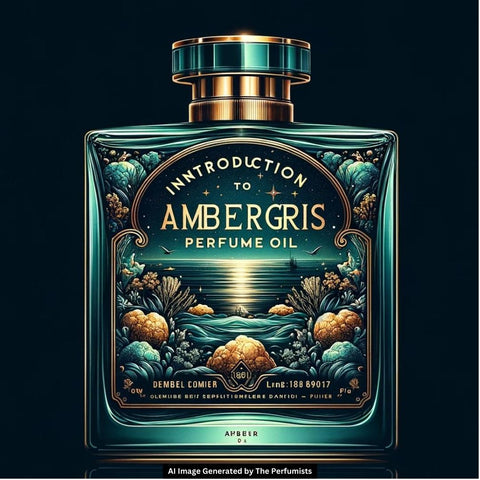Visit our Library and download Free exclusive e-books — click to discover and begin reading.
The Science Behind the Scent: Exploring the Chemistry of Ambergris Oil

Ambergris perfume oil holds a mysterious allure, captivating the senses with its unique aroma and luxurious appeal. In this exploration, we delve into the fascinating chemistry behind ambergris oil, unraveling the secrets of its composition and scent profile.

Introduction to Ambergris Perfume Oil
Ambergris perfume oil is derived from a rare and precious substance known as ambergris, which is produced by sperm whales. This waxy substance is formed in the digestive tract of the whale and is expelled into the ocean, where it undergoes a transformation over many years, resulting in a prized material highly sought after in the world of perfumery.
The Origins of Ambergris
Ambergris begins its journey as a secretion produced by the digestive system of sperm whales. When the whale consumes squid or other marine organisms with hard, indigestible parts such as beaks, a protective coating forms around these irritants within the whale's intestines. Over time, this coating accumulates additional layers of organic material, resulting in the formation of ambergris.
Composition of Ambergris Oil
Ambergris oil contains a complex mixture of organic compounds that contribute to its distinctive scent and properties. The primary constituents of ambergris oil include:
- Ambrein: Ambrein is a key component of ambergris oil responsible for its rich, animalic aroma. This compound is formed through the oxidation of other organic molecules within the ambergris, imparting a deep, musky scent to the oil.
- Ambrox: Ambrox is another important compound found in ambergris oil, known for its warm, woody aroma reminiscent of ambergris itself. This compound adds depth and complexity to the fragrance, enhancing its longevity and tenacity on the skin.
- Volatile Organic Compounds (VOCs): Ambergris oil also contains a variety of volatile organic compounds that contribute to its overall scent profile. These compounds evaporate upon application, releasing the fragrance into the air and creating an intoxicating olfactory experience.

The Scent Profile of Ambergris Oil
Ambergris oil is prized for its unique scent profile, which is characterized by its warm, musky aroma with hints of marine freshness and earthy undertones. The fragrance of ambergris oil is often described as sophisticated, sensual, and deeply alluring, making it a popular choice for luxury perfumes and fragrances.
Uses of Ambergris Perfume Oil
Ambergris perfume oil is valued for its versatility and luxurious appeal, making it a coveted ingredient in a wide range of fragrance products. Some common uses of ambergris perfume oil include:
- Best Oil Perfume: Ambergris perfume oil is highly concentrated, making it ideal for use in oil-based perfumes and fragrances. Its long-lasting scent and luxurious aura make it a favorite among perfume enthusiasts seeking a refined and sophisticated olfactory experience.
- Attar Perfume Oil: In traditional Arabic perfumery, ambergris oil is often used as a key ingredient in attar perfume oils, which are prized for their rich, complex aromas and exquisite craftsmanship. Attar perfume oils are applied directly to the skin, where they release their intoxicating fragrance throughout the day.
- Strong Perfume Oil: Due to its potent scent and long-lasting properties, ambergris perfume oil is often used in the formulation of strong, intense fragrances that leave a lasting impression. These perfumes are favored by those who prefer bold, impactful scents that command attention.
- Luxury Perfume Oil: Ambergris perfume oil is synonymous with luxury and exclusivity, making it a coveted ingredient in high-end perfumes and fragrance collections. Its rarity and sophistication add a touch of opulence to any fragrance composition, elevating it to a realm of pure luxury.
- Ambergris Essential Oil: While technically not an essential oil in the traditional sense, ambergris oil is sometimes referred to as such due to its aromatic properties and use in perfumery. Ambergris oil is prized for its natural, earthy scent and is often used as a base note in essential oil blends and aromatic formulations.
Conclusion:
In conclusion, the chemistry of ambergris oil is as complex and intriguing as the scent it embodies. From its origins in the depths of the ocean to its transformation into a prized perfume ingredient, ambergris oil continues to captivate and inspire with its rich aroma and luxurious allure. Whether used in oil perfumes, attar fragrances, or luxury scents, ambergris oil remains a timeless symbol of elegance and sophistication in the world of perfumery.